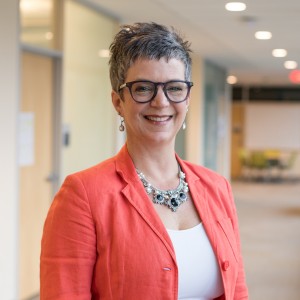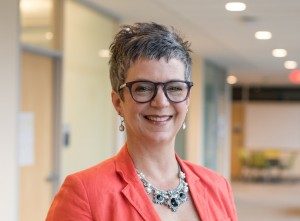Disagreements are a natural part of any conversation; at least, they used to be. Professors have been seeing more and more of a trend of students preferring to not speak up in fear of causing conflict among their peers, according to Yural Levin.
Yural Levin wrote the novel, “A Time To Build” which focuses on how campus cultures can stifle students’ ability to express their opinions. As noted in the book, Levi suggests that students don’t want to start arguments.
Inspired by these inquires, Lisa Sethre-Hofstad, Vice President for Student Development and Campus Life and a professor of psychology, decided that she would raise these questions at her symposium session titled, “I don’t agree with you, now what?”
Every single seat was taken, and some students stood in the back of the room to hear the answer to that single question. It was not just students that filled the seats—multiple faculty members were also in attendance.
Sethre-Hofstad was surprised by the number of students, simply because this concurrent session was designed to aid administrators and professors in relation to their students; however, the subject matter was applicable to all attendees because they all were looking for ways to disagree respectfully, especially when it comes to politics.
When it comes to confronting those we disagree with, Sethre-Hofstad makes the point that “you are challenging their experiences.” Navigating conflict can be challenging because it can take a lot of extra work to understand where another person is coming from, according to Sethre-Hofstad.
Rita Adejudge said that in terms of arguments, people can disagree to a point. “When it gets to a point where I am questioning my rights, and how you view my rights like life, liberty, pursuit of happiness,” Adejudge draws the line. One thing she hopes to take away from this session is to listen more. She has noticed that since her freshman year at Concordia, she has improved in becoming a critical listener, but taking that step further is something that she can work on.

Before turning the session over to the students for further discussion, Sethre-Hofstad claimed that media creates an illusion that we are more divided than we actually are. In terms of classroom participation, students can be afraid of the tension that different types of discussions bring out. Students are more cautious around how to broach a subject that is not comfortable to talk about, according to Sethre-Hofstad.
Not every student feels this way about participation in their classes. Senior Yoselin Morales said, “I feel like I am heard. I feel like I can say what I feel without being judged. There will be people who disagree with me, but also there will be people that agree. There will be people to back it up.”
Haleyna Young, who did not attend the session, answered similarly. Young said, “It feels like for me, it’s more of the issue of power between students and faculty.”
She feels comfortable speaking her opinion in her classes and with her peers, but she would feel better on an even playing ground.
During the concurrent session, Sethre-Hofstad claimed enhancing or identifying comfortable spaces for the collective college community can promote positive spaces for disagreement. The concurrent session participants gathered a list of action steps.
Concordia should create an anonymous opinion board for expression, cultivate an openness to be critical of inner thoughts and increase the diversity of opinions on campus. Although these tips will not solve all disagreements, they can lead to a more positive discussion and open environment.

